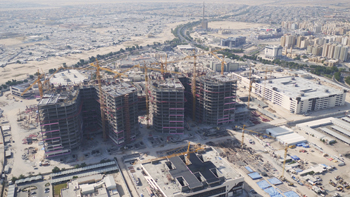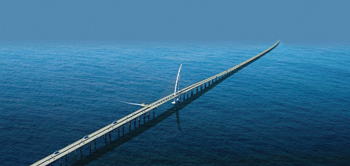Towards ‘New Kuwait’
Aiming to achieve its ambitious goals by 2035, Kuwait is encouraging the private sector to join it on a journey of development supported by increased government spending.
01 December 2017
An ambitious economic plan dubbed ‘New Kuwait’ launched early this year aims to steer the nation’s growth in an era of depleting oil revenues and transform the country over the next 17 years.
By 2035, the forward-focused roadmap aims to triple revenues, reform the education system and streamline regulations so as to encourage the private sector to join hands with the government in driving infrastructural growth and realise many of the Kuwait’s plans that have failed to take flight due to the endemic red tape – issues that still need to be addressed along with the political instability.
The private sector will increasingly be drawn into the country’s development plans – primarily into housing, power and water and tourism projects.
Kuwait, a pioneer in the region in the public-private partnership (PPP) sector – having initiated a PPP law back in 2008 that was subsequently fine-tuned six years later – is likely to offer projects worth nearly KD3 billion ($10 billion) to local companies and investors soon, according to news reports. These projects, being spearheaded through the Kuwait Authority for Partnership Projects (KAPP), comprise shopping malls, commercial and residential buildings, and three major amusement and tourism projects.
According to BMI Research, an ambitious economic diversification agenda will spur moderate overall growth of the construction sector, particularly in Kuwait’s port and industrial segments. Private capital will be instrumental in financing infrastructure projects in the face of lower oil prices, with a recent regulatory overhaul boding well for the country’s ability to deliver projects utilising a PPP model, says the research firm.
BMI forecasts real growth for 2018 at 5.1 per cent and an average five-year outlook at 4.5 per cent, anticipating that deficit spending and greater private sector participation will help offset the impact of lower oil prices.
Some KD4.74 billion has been allocated for infrastructure and other projects in the fiscal year 2017-2018 with the private sector expected to contribute 16.9 per cent of the spend through the PPP programme, according to the local daily Al Anba. The projects cover housing, roads, electricity, ports, airports, telecommunications and renewable energy, the newspaper reported quoting a senior government official.
According to another official, Kuwait has allocated $103 billion for 30 major projects, especially after adopting the PPP system.
Among the strategic projects outlined in the 2017-18 plan are the Sabah Al Salem University City; Zour refinery; the clean energy project; Kuwait Airport expansion, Terminal 2; Sheikh Jaber Al Ahmad Bridge; South Al Mutlaa City; New Sabah Hospital; new buildings at Farwaniya Hospital; a new building at Adan Hospital; Sheikh Saad Al Abdallah Islamic Centre in Jahra; and the Kuwait Centre for Rare Manuscripts and Publications.
The year, in fact, got off to a good start with the government having awarded contracts worth KD1.4 billion in the first quarter, according to a National Bank of Kuwait (NBK) report. However, the pace of project implementation cooled somewhat in the second quarter, as bidding on major projects faced some delays. Contracts worth KD600 million were awarded in Q2 with contracts worth some KD2.4 billion having been postponed during the quarter, the report said.
NBK added that it expected the pace to improve in the remainder of the year as more delayed projects move ahead with KD3.5 billion worth of new contracts likely to be awarded.
The oil sector dominated the contract awards in the first quarter followed by the housing sector. The oil sector saw a total of KD672 million contracts awarded for eight projects. Of this, the largest, worth KD397 million, was awarded for Kuwait Oil Company’s Gathering Centre 32.
 |
|
New Jahra Hospital ... a key healthcare project. |
Among housing contracts, the Public Authority of Housing Welfare (PAHW) awarded the second of four infrastructure contracts in South Mutlaa city, a strategic development project, to China Gezhouba Group under a KD216-million deal.
Other contract awards during the first quarter included expansion work on the airport. Contract award activity in Q2 was dominated by the power and transport sectors. The Ministry of Electricity and Water awarded a KD176 million contract for the third phase of the Subiya combined-cycle gas turbine project, while contracts worth a total of KD262.9 million were awarded three road projects by the Ministry of Public Works.
Housing
The $708-million contract awarded to China Gezhouba Group early this year entails construction of 18,000 housing units and road projects in South Matlaa, a new city located west of Kuwait City. The South Koreans too have entered Kuwait’s housing sector, with a consortium of construction firms having indicated their interest in building a $4-billion eco-friendly residential city. The Korean government will help form the consortium in 2018, which will develop a smart city for 25,000 to 40,000 with construction to begin in 2019.
Another key project is the Southwest Al Jahra labour city designed to accommodate nearly 20,000 expatriate workers. It will be the first such project to be offered to the private sector on a PPP basis, reported the Arabic daily Al Nahar.
Airport
Construction work on Kuwait International Airport’s new KD1.31-billion passenger terminal is reported to be more than 30 per cent complete, with Turkey-based construction company Limak Insaat having started main construction works early this year. The project, which aims to be one of the world’s first Leed-Gold certified terminals, is designed to handle 25 million passengers a year, scalable for an additional 25 million in the future. Work has also been launched on the upgrade of the airport with the construction of new runways in addition to extending existing ones and other infrastructure.
Work is under way on the Al Jazeera passenger terminal and will be completed next year (see separate article).
Power & Water
In line with the region’s drive to exploit its abundant solar energy potential, Kuwait is expected to float a tender to build the estimated $1.2-billion Dibdibah solar power plant in the first quarter of 2018.The 1-GW project, to be completed by 2020-end, is part of the country’s plans to produce 15 per cent of power from renewable sources by 2030.
Construction is under way on the Subiya Extension Three combined cycle power plant in the northeast. The natural gas-fired plant, which can also be operated with oil as a back-up fuel, will have capacity of 900 MW. Work is also in progress to upgrade the Az Zour South Three open-cycle gas turbine power plant into a combined cycle plant. The plant is expected to go into operation in mid-2019 with its capacity increased by 263 MW.
Early this year, Kuwait launched operation of the $1.7-billion Azzour North One, the first independently owned power and water plant in the country owned and operated by Shamal Azzour Al Oula. Among the eagerly anticipated contract awards is for the KD530-million Phase Two of the Al-Zour North IWPP. According to Meed Projects, the KAPP has yet to decide on whether to proceed with this project or with the Khairan IWPP.
Roads, Bridges & Metro
Kuwait’s 36-km-long engineering marvel, the Sheikh Jaber Al Ahmad Al Sabah Causeway, is on track for launch in 2018. The $3-billion project – also known as Subiya bridge – is about 86 per cent complete. One of the world’s longest causeways, Subiya will cut the travel time between Kuwait City and Subiya to 20-25 minutes from 90 minutes now.
Among the major road projects nearing completion is Jahra Road, which is about 95 per cent complete. The 17.7-km project will be connected to the Jamal Abdul Nasser viaduct, a parallel road currently under construction. Another key road development is the KD84.6-million ($280 million) Wafra Road, the first phase of which is slated for completion by next March.
Meanwhile, initial studies have been completed for Kuwait’s ambitious metro project. The estimated KD1-billion network, expected be pursued with private sector participation, will be 171-km long.
Oil & Gas
Kuwait National Petroleum Company’s (KNPC) project spending over the next five years is likely to touch KD3.5 billion, CEO Mohammad Al Mutiari said. KNPC is developing a clean fuels project that will upgrade and expand two of its largest refineries to make higher-value product. He said a gas line project with a capacity of 805 million cu ft per day, being built at a cost of KD428 million is under way. Other projects include KD210-million liquid sulphur treatment facilities at Al Ahmadi refinery. Meanwhile, Amec Foster Wheeler is working on an integration project for Petrochemical Industries Company (PIC), a subsidiary of the Kuwait Petroleum Company (KPC), for its Olefins III, Aromatics II and Zour Refinery. The petrochemical facility will be integrated with the new Al Zour 615,000-barrels-per-day refinery, which will be one of the largest refineries in the region.
- Towards ‘New Kuwait’
- New Avenues
- Hub for Jazeera Airways
- Raising the bar
- NFT seals historic deal for Kuwait airport
- Kuwait at a glance



